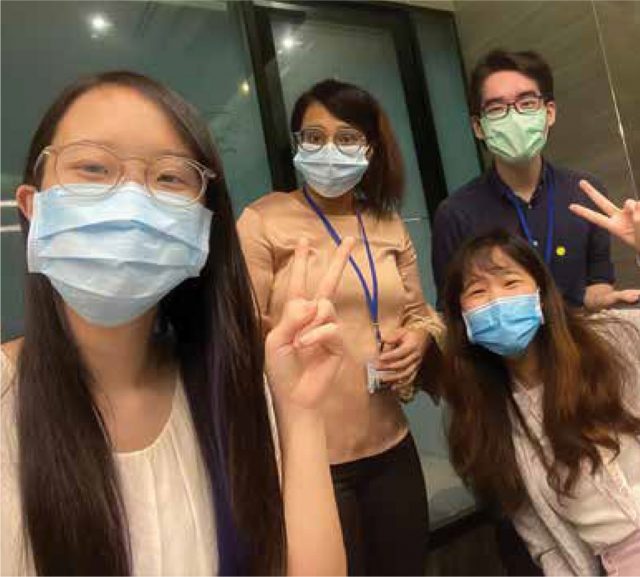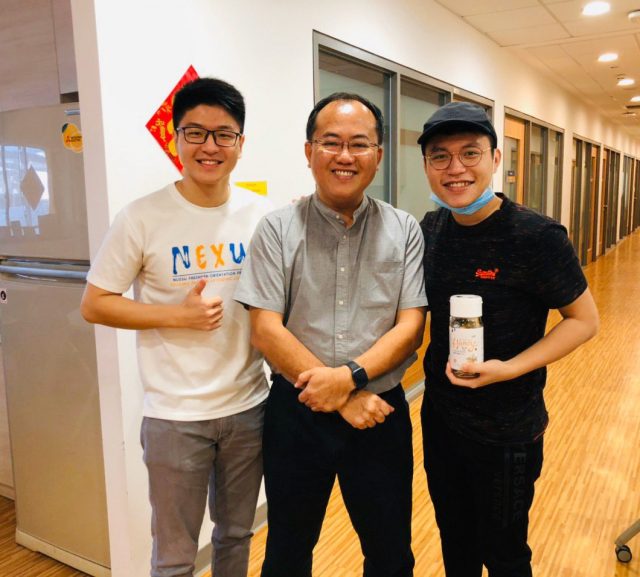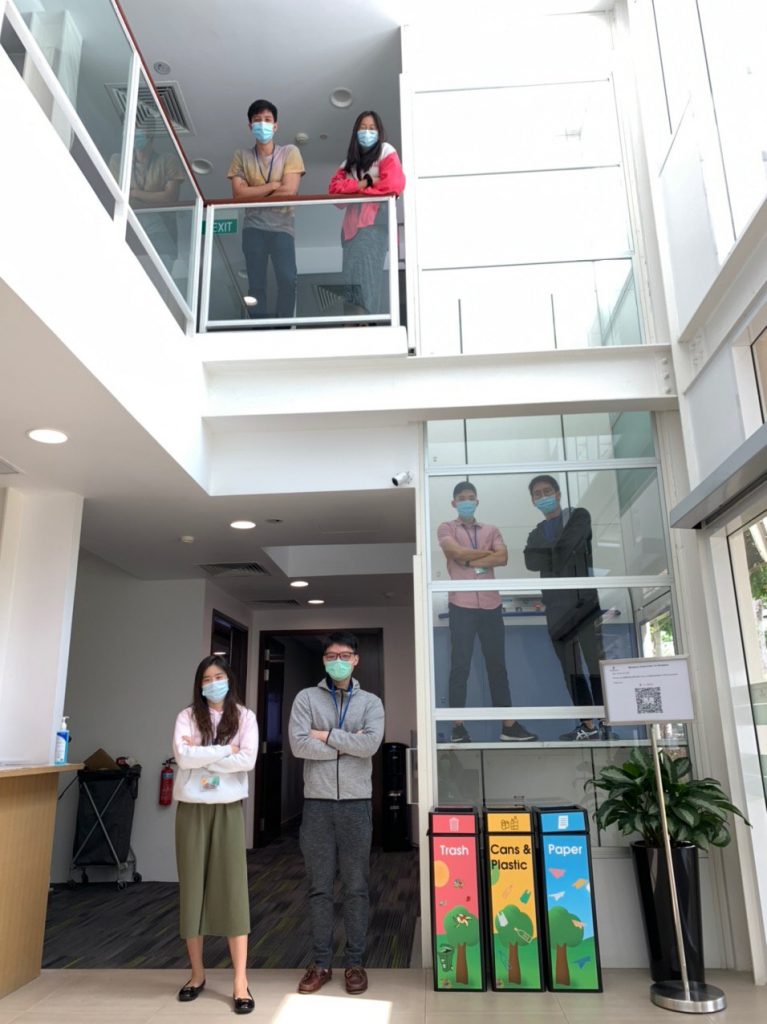Medical Students Turned Emergency Workers in Pandemic Fight
By Ainsley Ryan Lee Yan Bin, Joelle Tan Hwee Inn and Emma Toh Min Shuen, Phase III NUS Medicine students
When DORSCON Orange was first announced in February, we were then-Year 2 students walking in as a class to our last afternoon of lectures before our study break. We were too young to remember SARS and new to the healthcare scene. It was a time of uncertainty and apprehension for everyone around us.
This was also a time that the very best of humanity came to the fore. Every so often in the following weeks, we read and saw countless news reports in the media, around the world and in Singapore, about the selfless sacrifices that healthcare workers were making. These stories got us thinking: inspired and warmed by such dedication, we mulled over how we as medical students could contribute to the fight against COVID-19. We may have a lifetime ahead of us to serve and heal, but we too wanted to do what we could, now, as students.
Fortunately, our teachers were most supportive and even offered us the opportunity to establish an attachment supporting the efforts of the Emergency Preparedness and Response Division at the Ministry of Health (MOH).

Emma (left) and Ainsley (top right) on their final shift at the MOH.
From April to August, 94 current medical students across all years offered their time and skills in administrative roles to support the multi-ministry helmed task force. Students were spread out across a variety of departments and worked alongside colleagues from various fields, disciplines and organisations, including the civil service and Singapore Armed Forces (SAF). Many were involved in managing the gargantuan task of coordinating swabs and transportation of persons under quarantine, as well as admissions and discharges for COVID-19-positive individuals. Our students also represented MOH as a liaison to other ministries, where they developed workflows and processes.
Initially, many of us had doubts as taking up this opportunity would mean spending a majority of our time during our holidays working instead of taking a break. However, the camaraderie we experienced during our short stint working with officers from the various ministries left us with an even greater conviction of our purpose.
A fight on many fronts
Apart from our efforts in assisting the multi-ministry helmed Emergency Preparedness, the school saw many students stepping up in other capacities as well. Even before COVID-19 reached Singapore’s shores, a team of medical students led by Phase III student Peng Genyi, moved by the brewing crises in Wuhan, worked on a fundraising project, ‘Wish Wuhan Well’, together with students from the universities across Singapore to support hospitals at the epicentre in China with medical equipment. What began as a small fundraising initiative amongst students soon saw an outpouring of support, enabling donations of equipment to hospitals across three cities in China.
As we saw the situation evolve in Singapore, we saw the toll on society. Local businesses, especially in F&B, were taking massive hits and our immensely dedicated workers in healthcare, maintenance and many more were working longer hours, and harder than ever.

Directors Peng Genyi (first from left) from NUS Medicine and Wang Peng Fei (third from left) from Singapore Management University, with A/Prof Ng Yee Kong. (Photo taken before implementation of COVID-19 safe distancing measures, when classes moved online.)

A delivery for healthcare workers from Project ‘In a Heartbeat’, launched by Phase III students Rachel, Joelle and Ainsley.
This motivated the creation of Project ‘In a Heartbeat’, named by founding member and Phase III student, Rachel Teo. The team set to work collaborating with local F&B businesses to simultaneously support workers on the frontlines. Over the months that followed, deliveries of refreshments and notes of encouragement reached over 1,000 healthcare workers in various hospitals, polyclinics and nursing homes across Singapore. For individuals who wished to show gratitude and solidarity aside from volunteering or donating, we set up a social media platform for them to pen motivational messages. These were printed on origami hearts as notes to go along with the refreshments.
We were immensely heartened that our efforts inspired local F&B businesses to begin their own welfare drives and campaigns as well for healthcare workers!
Looking Back: More than a Duty, Privilege and Honour
We may have a lifetime ahead of us, serving and giving back to our society; but there is still much we can do for Singapore as medical students. Working at MOH helped us pick up many new skills that are certainly applicable to our future role as doctors. We learned how to communicate effectively and clearly in stressful, time-sensitive situations, as well as problem-solving and even some auditing skills.
Initially, the learning curve was very steep as we had to adapt quickly as the COVID-19 situation evolved, and we could not afford to learn slowly. It was imperative to not just keep up, but endeavour to stay ahead at every turn. We had to adjust to learning new terms and acronyms—such as Persons Under Quarantine (PUQs) and understand the needs and contributions of various ministries like the Ministry of Manpower (MOM), Ministry of National Development (MND) and Ministry of Trade and Industry (MTI). The dynamic nature of the situation meant that Standard Operating Procedure (SOPs) had to be changed every few shifts and we had to adapt to these changes quickly, and discuss ways to adapt our SOPs when we met with unexpected roadblocks. Through the flurry of discussions and difficulties, our colleagues treated us with great respect despite our youth. For the first few shifts, it indeed took some time adapting to the realisation that we were not there as students, but staff members, part of a nationwide team effort.
While working at MOH, there was not much time to think and reflect on the importance and weight of our role. It felt surreal that the administrative operations we were doing had very real and direct impact on the PUQs and their families we were serving.

Students from the Class of 2023 at the Quarantine Operations team at MacAlister Hall.
Looking back, we now see how we had the rare opportunity to work with a diverse group of people and be part of a nationwide fight worthy of the history books. COVID-19 has brought about several changes in Singapore. Moreover, it has brought sectors together and united individuals across the nation. It has been nothing short of an honour to have been part of the fight against COVID-19, a crisis that has given us an even greater conviction to serve as doctors in the future.
Show your support for frontline workers or check out inspiring messages collected.
